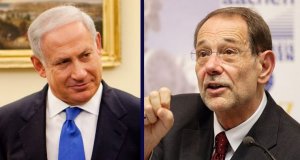Javier Solana, European Union Policy Chief

Hours before Prime Minister Benjamin Netanyahu was to deliver a major foreign policy address on Sunday evening, Palestinian officials said that a "yes or no" decision faces the Israeli leader regarding Middle East peace.
"What's required from Mr. Netanyahu is a yes or a no — two states, accept agreements signed and to stop settlement activities including natural growth," said Palestinian negotiator Saeb Erekat.
Palestinian President Mahmoud Abbas, himself at loggerheads with Hamas, has said talks with Israel cannot resume until Netanyahu halts settlement and accepts a two-state solution. "We will indeed listen to the speech very carefully," Palestinian Erekat said. "We hope that for a change the prime minister, Mr. Netanyahu, will be clear, precise, focused and to the point."
Netanyahu is expected to devote a more significant part of his greatly anticipated foreign policy speech to Tehran's nuclear threat, officials close to the premier said, in the wake of Iranian President Mahmoud Ahmadinejad's electoral win Saturday.
The officials added that this is a golden opportunity for Netanyahu to stress the issue before the world, after having called for years to stop Iranian nuclearization.
In the address, which Netanyahu will deliver Sunday evening at Bar Ilan University, the prime minister is expected to announce his adoption of the road map peace plan and a two-state solution to the Palestinian-Israeli conflict.
The speech comes in the wake of tremendous pressure from U.S. President Barack Obama on Netanyahu to back the establishment of a Palestinian state and declare a freeze on West Bank settlement construction.
Defense Minister Ehud Barak, a senior coalition partner of Netanyahu's, told fellow Labor ministers on Sunday to lower their expectations ahead of the address.
"The speech will be very cautious, very vague, and [you] should lower expectations ahead of it," Barak said at a meeting.
Netanyahu met with Barak and President Shimon Peres over the weekend for consultations about his speech. Peres and Barak reportedly pressed Netanyahu to announce in the speech his acceptance of the road map and willingness to recognize a Palestinian state with security limitations.
Meanwhile, Netanyahu vowed Friday that he would not permit the establishment of a Hamas-ruled Palestinian state in the West Bank.
 |
The prime minister's message to Solana may be considered another hint that he does not intend to announce any dramatic policy changes in the address.
A government source in Jerusalem, who has been informed of the details of the prime minister's conversation with Solana, said Netanyahu did not speak specifically about the content of his speech, but presented his positions on a number of issues it is expected to address.
"I am ready to immediately renew talks with the Palestinian Authority," Netanyahu told Solana. "Each side will present its positions and we will see what progress we make," he added. However, Netanyahu did not speak specifically about a Palestinian state or a two-state solution.
Netanyahu reiterated to Solana Israel's security demands, including demilitarization, control of air space and control of border crossings.
At one point in the conversation, Netanyahu mentioned the interview Palestinian president Mahmoud Abbas gave to the Washington Post, in which he said the onus was entirely on Netanyahu and the Palestinian Authority was under no pressure from the United States.
"It would be a mistake for the United States and the EU to give the Palestinians the feeling that they are not required to meet their obligations, such as fighting terror. All sides have to do their part, so do the Arab countries. Israel must not be required to do everything with regard to the settlements, too," Netanyahu told Solana.
Netanyahu reiterated to Solana that "the demand to freeze construction in the settlements is unrealistic and in opposition to previous agreements and understandings under which Israel operated."